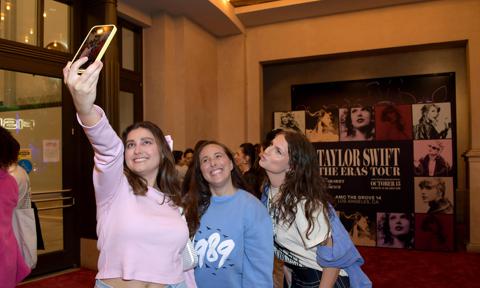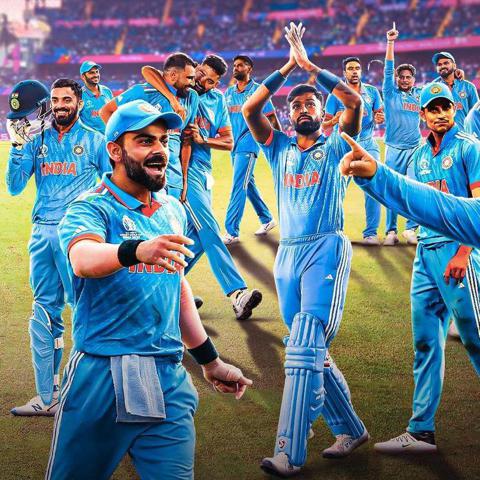
The first thought that came into my mind after sitting through hours of my father and husband cursing at the screen as India and Australia squared off against each other at the ICC Men’s Cricket World Cup on Sunday night was “It’s cute how much they care about this”. The second was that I can hardly remember a day where I was afforded the same understanding when I get excited about BTS performing on stage.

This argument made me think back to the tweets that declared Swifties dancing around in theaters while watching Taylor Swift’s Eras tour film the ‘peak of cringe’. And then, the rest of my night was spent unpacking the glaring disparity with which we view traditionally female and male fan bases.
Why is it OK for grown men to spend hours in front of the TV and passionately react to how players of their favourite game, be it cricket or football, are performing? But, when women cheer on a K-pop group or say a Taylor Swift or Justin Bieber, it’s dismissed as cringe?
The answer is, of course, patriarchy and how it has allowed cisgendered and heterosexual men to dictate what is ‘cool’ and therefore reduce millions of women into a hysterical mass that screams and obsesses over frivolous interests.
The phenomenon is not new. In 1964, Paul Johnson wrote an essay for The New Statesman titled ‘The Menace of Beatlsim’ where he derided fans of the iconic band, by writing, “Those who flock round The Beatles, who scream themselves into hysteria, whose vacant faces flicker over the TV screen, are the least fortunate of their generation, the dull, the idle, the failures.”

In 2021, former talk show host James Corden took the low hanging fruit by making a joke about K-pop supergroup BTS’ presence at the 76th United General Assembly. Corden joked, “It actually marks the first time that 15-year-old girls everywhere found themselves wishing that they were Secretary General António Guterres.”
Though he deleted the video amidst backlash from fans and feminist critics, Corden’s views are hardly isolated. Fangirls have been reduced and dismissed as being young, pre-teens who hardly know better. These hysterical fans are gold for advertisers but shouldn’t be taken seriously as it’s all superficial.
I’ve been a fangirl most of my adult life. It began with Harry Potter and expanded into virtually every category, from YA novels to anime to K-pop. I’m a 30-year-old who is always logged into stan Twitter (if you don’t know what stan Twitter is, consider yourself blessed) and proudly carries Kim Namjoon and OT7 photocards on my phone case. So, I consider myself a good authority on how reductive it is to dismiss anyone who screams about Taylor Swift’s new album release or Harry Styles’ concert as tweens who don’t know better.
If you recall, back in 2020 during the height of the Black Lives Matter movement in the USA, K-pop stans destroyed white supremacist hashtags by flooding these with fancams of their idols. BTS ARMYS, as the fandom is called, also managed to match the band’s donation to the cause by rallying support from fans around the world. The fandom also created networks of lawyers, doctors, and other professionals to guide and mentor young people on a global scale.

In the immensely entertaining podcast Name 3 Songs, journalist Lucy Ford joined co-hosts Sara Feigen and Jenna Million to discuss how men in the fandom spaces, be it Marvel or music, act as gatekeepers and bullies, often dismissing women in the space for being interested only for superficial reasons like the actors’ or the musicians’ looks as opposed to their abilities.
Over the years, fangirls have also been compared to Maenads from the Greek mythology. These were the female followers of Dionysus, the Greek God of wine and pleasure. The name literally translates as ‘raving ones’ and they have been portrayed as always being in a state of ecstatic frenzy through a combination of dancing and intoxication.
The same cannot be said about how men’s interest are considered ‘legitimate’. Or how they can openly talk about how they spend their entire day vegetating in front of the TV since a match was on. But can you recall the last time you mentioned liking, or even listening to, a BTS song without encountering barely-concealed derision at your life choices?
Policing female behaviour and actions is not something that will disappear overnight, especially not after this impassioned rant for sure. But if even one of you can let go of the double standards set by cis-het men on what is cool and uncool to like, then that’s a win!
- Quick links
- cricket
- cricket world cup
- Taylor Swift
- bts
- feminism






